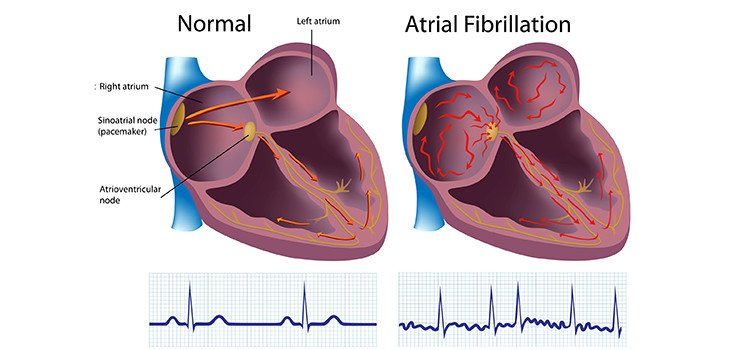Know the Causes and Symptoms of Atrial Fibrillation

Atrial fibrillation, or AFib, affects between 2.7 and 6.1 million people in the United States. Approximately 9% of people over the age of 65 are afflicted with this heart condition. [2]
AFib is the most common type of heart arrhythmia. The disorder occurs when the heart beats too slowly, too quickly, or in an irregular way, and the blood doesn’t flow properly from the atria to the lower two ventricles of the heart. It can be an off-and-on occurrence, or it can be permanent. [1]
People with AFib may feel shortness of breath after minimal physical activity. They may experience heart palpitations that feel like the heart is beating too slowly, or like it is flip-flopping, skipping beats or racing. The symptoms of atrial fibrillation can also feel like having butterflies in your chest, or like your heart won’t stop pounding.
Just because you don’t feel the symptoms of AFib doesn’t mean you don’t have the arrhythmia, and it doesn’t mean you can’t suffer the consequences of the disorder. About 750,000 people are hospitalized with atrial fibrillation every year in the U.S., and it contributes to more than 130,000 deaths each year.
This medical condition increases a person’s risk for stroke by 4-5 times compared with people who don’t have AFib. Over the past 20 years, the death rate from AFib as the primary or contributing cause of death has been rising steadily. [2]
Atrial fibrillation is not a one-size-fits-all type of arrhythmia. Paroxysmal fibrillation, in which the heart slips in and out of irregular contractions, is one type of AFib. Chronic AFib patients tend to show fewer symptoms or none at all, simply because they’ve grown used to them and don’t notice them anymore. But people with paroxysmal more readily notice the difference because the symptoms come and go.
People are more likely to develop AFib if they:
- Drink alcohol. The American Heart Association recommends that women have no more than one drink a day, and men have no more than two. Alcohol can weaken the heart muscle, raise blood pressure, and make it challenging for the heart to pump blood effectively. Binge drinking is strongly linked to AFib.
- Have high blood pressure. Hypertension makes the blood flow through the body more forcefully than it should. Eventually, that pressure can extend to the walls of the atria, sometimes causing AFib.
- Have diabetes. Diabetes increases the risk for heart disease and kidney problems by harming metabolism and raising sugar levels.
- Have Hyperthyroidism. AFib can be attributed to hyperthyroidism in about 5% of cases. Hyperthyroidism, or an overactive thyroid, occurs when the gland produces too much thyroid hormone. Too much of this hormone affects metabolism, thus contributing to AFib.
- Have sleep apnea. People with sleep apnea stop breathing during the night, which slows and stresses the heart. The connection between AFib and sleep apnea is not fully understood, but it is believed that a hormone released by the body in response to the pause in sleep is a contributing factor. Additionally, sleep apnea often causes the heart to try and overcompensate for beating slowly by beating too fast, resulting in atrial fibrillation.
- Are getting up in age. The valves of the heart get tired and slow down as people age. As mentioned earlier, 9% of people over 65 have AFib. About 10% of seniors over 80 also have the arrhythmia.
Common signs and symptoms of atrial fibrillation include:
- Chest discomfort or pain
- Irregular pulse
- Shortness of breath
- Dizziness or confusion
- A sensation of fear or anxiousness
- Light-headedness or fainting
- Feeling exhausted or a lack of energy [2]
Sources:
[1] Everyday Health

I had an afib episode once over a year ago, I have had no trouble since. Not sure what caused it, I had been working nights 60 to 70 hours a week for a couple of months after being on days for many years that may have contributed. Possible dehydration , stress at home, to much caffeine, not sure. The doc put me on meds for awhile but after about 5 months I told him I didn’t want to take any more. He basically said that it would probably happen again if I stop eating the drugs. I still work nights 60 hours most weeks, I still have one cup of coffe everyday, I don’t exercise but really want to, not enough time. I take magnisium supplements and daily vitamins. The reason I am posting is that after the afib I was very scared that it would happen again my heart was racing very fast , that kind of afib is scary, but here I am over a year later and I’m OK. It seemed like the doctors just wanted to keep me coming back and writing more scrips, assuring me that I’m a sick man but my blood work is all good and I’m only 47. I think prayer helped me more than anything.
I’m 45 yrs old and just found out I had AFib last Monday, when I was in the hospital.
I’m curious to know if AFib is a modern western phenomenon. In other words, if you compared the population of western societies with a healthier society like Japan, is the amount of AFib the same in the population?